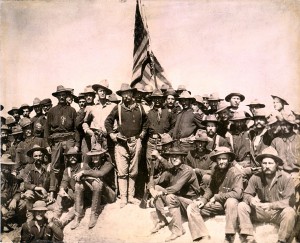 In his fascinating article on Theodore Roosevelt’s complicated nationalism, Gary Gerstle offers students in History 118 a series of challenging ideas. First, Gerstle explains how Roosevelt saw world history in terms of race conflict and believed earnestly in a hierarchy of racial categories –an idea embraced by most people in the nineteenth century. Gerstle then offers compelling details about Roosevelt’s famous experiences with the Rough Riders in the Spanish-America War. Yet instead of focusing on the standard romantic myths about the diverse and rowdy regiment, Gerstle demonstrates how Roosevelt celebrated his fellow Rough Riders at the expense of equally heroic black troops during that brief conflict in Cuba. Students who read this article should be able to identify Presley Holliday, a remarkable man who challenged Roosevelt’s version of the war’s history. Despite Roosevelt’s reluctance to acknowledge black equality, he did reach out to selected African Americans, such as Booker T. Washington. Gerstle goes even further, arguing that what he labels Roosevelt’s “civic nationalism” was a precursor to the spirit of Martin Luther King’s “I have a dream” speech and the modern civil rights ideal. He claims that Roosevelt was full of contradictions and that despite his belief in racial hierarchy, and his distaste for blacks and Chinese in particular, he was also a deep believer in the equality of American citizenship and the principle of the “Melting Pot.” Gerstle suggests that in this contradiction, Roosevelt embodied a Progressive Age in America that contained competing ideas of what it meant to be American. Students who need extra background on the diverse topics covered in this article should consult with the online textbook at Digital History, noting especially the chapters on Along the Color Line, Closing the Western Frontier, Huddled Masses, United States Becomes a World Power, and the Progressive Era.
In his fascinating article on Theodore Roosevelt’s complicated nationalism, Gary Gerstle offers students in History 118 a series of challenging ideas. First, Gerstle explains how Roosevelt saw world history in terms of race conflict and believed earnestly in a hierarchy of racial categories –an idea embraced by most people in the nineteenth century. Gerstle then offers compelling details about Roosevelt’s famous experiences with the Rough Riders in the Spanish-America War. Yet instead of focusing on the standard romantic myths about the diverse and rowdy regiment, Gerstle demonstrates how Roosevelt celebrated his fellow Rough Riders at the expense of equally heroic black troops during that brief conflict in Cuba. Students who read this article should be able to identify Presley Holliday, a remarkable man who challenged Roosevelt’s version of the war’s history. Despite Roosevelt’s reluctance to acknowledge black equality, he did reach out to selected African Americans, such as Booker T. Washington. Gerstle goes even further, arguing that what he labels Roosevelt’s “civic nationalism” was a precursor to the spirit of Martin Luther King’s “I have a dream” speech and the modern civil rights ideal. He claims that Roosevelt was full of contradictions and that despite his belief in racial hierarchy, and his distaste for blacks and Chinese in particular, he was also a deep believer in the equality of American citizenship and the principle of the “Melting Pot.” Gerstle suggests that in this contradiction, Roosevelt embodied a Progressive Age in America that contained competing ideas of what it meant to be American. Students who need extra background on the diverse topics covered in this article should consult with the online textbook at Digital History, noting especially the chapters on Along the Color Line, Closing the Western Frontier, Huddled Masses, United States Becomes a World Power, and the Progressive Era.
